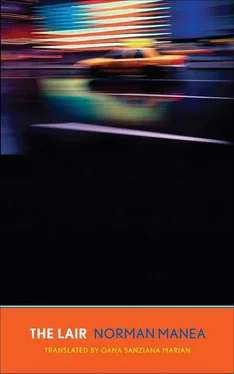He watched me, frowning, and lit a cigarette.
“Maybe you’ve heard that I occupy myself with esoteric adventures. I read the coded signs of destiny. The signs around me, as obscure as they are, signal danger. . They can liquidate me here, too, naturally, but also there.”
I waited for him to clarify. He didn’t.
“In our past, everything was about compromise and complicity. The very fact of breathing that air. . all compromise and complicity. Why did they give me a passport? Usually, it was a bargaining process. You gave them something, they gave you something. There were all kinds of schemes, as well. A Byzantine country, life under the table as opposed to on the table. Relations, interests, the chain of weaknesses. Don’t ask me any more about it.”
I had no intention of asking anyone anything, except myself.
“Language wasn’t my essential loss. I left that place a young man, I wrote here from the very beginning. I’ve published books, I have more in a drawer… It’s a great danger always to be asked for manuscripts and to have everything you write be accepted. Dima, for example. . published too much. Apropos, the sentinels were, of course, interested in my relation to him. They wanted to organize his festive return to the Homeland. They didn’t care about his anti-Communist past. The masquerade would have legitimized their regime. As a young man, Dima imagined himself as a reformer, only the reform was reactionary.”
He’d stopped, to think, or to remember.
“Have you heard about Heal, the physician? And his group? They walk on burning embers without feeling anything. We were also walking on burning embers in that attic, weren’t we? However, we were afraid, suspicious, sensing the duplicity. In California they do research about the technical modification of consciousness. What do you think about this country? It would be more worthwhile to talk just about the New World, the old one has gotten old for good; it was always old. There, in the old attic of the old country, I started the cult of Dima. But neither of us knew about Marga Stern. I think that Gora invented her. Potentialities become realities in his obituaries. I agree that life isn’t made solely from the real and visible. But potentialities are codified. Gora is under the trance of books… though he also has some revealing insights.”
A long, long silence. Endless. Palade had grown silent and was no longer looking at me. I had disappeared for him.
“Indifference is human, isn’t it?”
He didn’t hear me.
“Estrangement, human, as well. Human. Isn’t that right, Mihnea? We’re human.”
“Yes, yes. . the Nazi horrors in the East weren’t Dima’s priorities. He wasn’t vilifying the people of Marga Stern’s religion. They just weren’t his priorities, that’s all.”
He lit his cigarette and was seeing me again.
“Soon the last survivors will disappear. Do we forget or do we retain the symbol without which we won’t understand ourselves?”
He shook the ash and angrily tossed the unfinished cigarette.
“Yes, indifference, estrangement. Self-obsession. Still, he was generous, eager to help, sensitive. He was like that in the past, too, when he was propagating nightmares wrapped in green foil, with saints’ faces. I believe in parallel worlds. Multiple worlds. Then, also duplicity. Not always a negative thing. Man isn’t an unequivocal being. He has fissures and secrets. Obscure potentialities. You think I’m an obnoxious sophist, don’t you?”
He’d lit another cigarette in the meantime, he’d remembered to offer me one, too; I was happy that I’d quit smoking. He watched me with excessive attention.
“You, sir, ought to understand Dima’s ambiguities. People always expected you to be perfect, and you couldn’t be. Angels don’t write books.”
Only after many years I was to discover that Ga  par had used that aphorism, which evidently wasn’t originally his own.
par had used that aphorism, which evidently wasn’t originally his own.
I didn’t like to be addressed formally, but, like Mihnea, I was also drawn by contradictions and fissures and secrets and unexpected potentialities, only for me, people seemed more important than ideas. “People are more important, Mihnea,” that was what I wanted to tell Mihnea Palade. I didn’t get the chance.
“Imagine that, they didn’t allow me to see the archives! Me! I was his loyal admirer and apprentice. They didn’t let me see the archives from the moment that I began to ask questions. I advised him to stop seeing that old, fanatic doctor. The correspondent for the Iron Guard in the United States! Absolutely ridiculous! I assume you’ve heard of the doctor in question.”
My silence was a sign of consent. Palade wasn’t looking for consent, however, he merely wanted to spill his poisons. I’d become posterity’s witness.
“I hear that Gora saw the secret archive. I doubt that he saw it.”
He was jealous. He’d adored Dima, he didn’t expect someone else to be favored.
A good moment to attack. I asked him whether Gora could have been an informant. It was a way of asking him, indirectly, about himself.
“Could he have been? Anyone could have been. Not because he was predestined, but because destiny was enslaved to the Supreme Institution. The Devil had become a little intermediary, a bully and a bureaucrat, and man has unimaginable capacities. Integrity and duplicity, just as surprising. Think of the adulterer.. parallel lives. Sometimes, for years, decades. Pent-up mysteries in the fragmented depths. Parallel worlds. Computers are going to perfect these opportunities, all the way to an absolute bewilderment. You’ve heard, I’m sure.”
I’d heard a little bit, but not much; I was prepared to hear anything and commit it to memory.
“You put on some special gloves and the computer program suddenly gives you access to the world into which you’ve entered. You operate in a different world. Through the gloves, the hands take hold of the objects of other worlds, they touch and handle and modify them.”
He digressed. Was it an allusion to Gora? It wasn’t clear.
“Ah, yes, but you asked about Gora. I was his student, we were close. He left before me, as you know. They say through the interventions of his wife’s relations. I don’t think so. It would have been too much if they’d wished to separate her from him. In any case, the suspicion remains. Just as in my case. The great victory by the system. Generalized suspicion has a longer life than the system itself. An unflinching, motionless posterity.”
He looked me straight in the eyes once again. Not to dispel suspicions, but seemingly, to fuel them.
“Gora is a civilized man, through and through. With all of the hypocrisy and lacquer that civilization implies, naturally. I wonder, is the obsession with Lu credible? There are plenty of erotic services available, with superb and costly young women fit for a solitary aristocrat. An aristocrat, yes, not by birth, but by erudition. Gora’s nights? Secretive nights, you can be sure. Books need the company of women. Women, not just one woman. Lu isn’t just one woman, but many. What I know is that Gora left legally, with the approval of the authorities. He tried to bring Lu. Did he need the Institution’s help? I don’t know. Dima tried to help him. Gora was bitterly opposed to any visit by Dima to his Communist Homeland. No, no, no, not at any price, Gora would yell, red with indignation. Dima wasn’t as intransigent. Old as he was, he’d lost hope in the death of Communism. He was homesick for the places of long ago, he thought a visit would also serve his international prestige. The Institution’s propagandist alibis succeeded in convincing the Occident that our adored dictator, the Genius of the Carpathians, was building a special socialist democracy. A special democracy, within a special socialism. We were becoming, one would say, a special species.”
Читать дальше

 par had used that aphorism, which evidently wasn’t originally his own.
par had used that aphorism, which evidently wasn’t originally his own.










